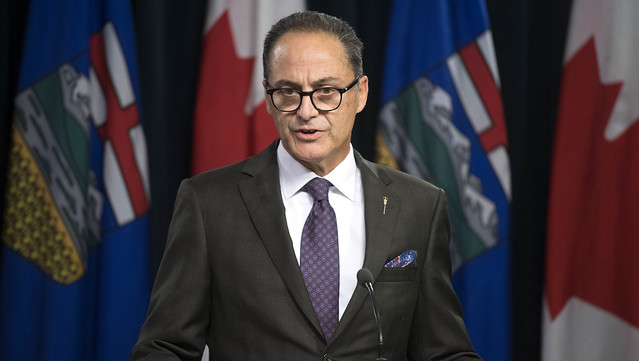This release was issued under a previous government.

Finance Minister Joe Ceci provides details of the 2018-19 First Quarter Fiscal Update and Economic Statement.
Increased exports, wholesale trade, manufacturing and earnings all point to an ongoing and broad-based economic recovery.
Alberta will be a leader when it comes to economic growth this year and next. The 2019 forecast has been revised upward to 2.7 per cent GDP growth. The number of rigs drilling in Alberta was up 6.7 per cent year-to-date. In other oil-producing provinces, the measure was down 9.7 per cent
Total revenue projections have grown by $1.2 billion with personal income tax revenues and resource royalties recovering better than expected.
“I am pleased with these results. Jobs are up. The economy is growing. And the deficit is down. But we won’t be satisfied until every Albertan feels the economic recovery. We will continue to work to make sure our kids have good schools and our loved ones get the care they need.”
Trans-Mountain Pipeline
While the Federal Court of Appeal decision on the Trans-Mountain Pipeline does not affect the government’s finances for the First Quarter or for the 2018-19 Fiscal Year, the decision is bad for Alberta’s economy, the national economy and working families across the country. That is why the Premier has demanded immediate action from Ottawa to recall an emergency session of Parliament to fix the mess it created and resume pipeline construction.
Economy continues recovery
Beyond pipeline capacity, government is forecasting 2018 real GDP growth to be 2.7 per cent and is revising upwards its 2019 forecast from 2.5 per cent to 2.7 per cent. Many economic indicators, including exports, manufacturing, rig activity and wholesale trade, have seen notable gains this year. Corporate profits are also expected to be higher in 2018.
Meanwhile, Alberta’s labour market continues to improve. Robust earnings growth has been coupled with job gains, adding to the large rebound seen in 2017.
Economic indicators
- Average weekly earnings in Alberta have seen solid growth this year, increasing by 3.2 per cent as of May.
- Employment is up 1.7 per cent year-to-date, with full-time gains accounting for the entire increase.
- The number of rigs drilling in Alberta was up 6.7 per cent year-to-date. In other oil-producing provinces, this measure was down 9.7 per cent.
- Merchandise exports are up 11 per cent year-to-date, fuelled by strong gains in both energy and non-energy exports.
- Wholesale trade remained solid in the first half of 2018, and is up 7.9 per cent year-to-date.
- Manufacturing shipments are up 5.4 per cent year-to-date, and are less than five per cent below the July 2014 peak.
- The total output of crude oil is up 9.8 per cent year-to-date, with solid gains in both conventional and non-conventional production.
- Retail sales are trending higher in 2018, up 2.5 per cent year-to-date.
- Alberta’s population continues to expand faster than the national average. It is estimated that the provincial population increased by 62,000 people between July 2017 and June 2018.
2018-19 First quarter forecast ($ millions)
|
Full-year forecast |
Budget 2018 |
Q1 forecast |
Change from Budget |
|
Income taxes |
15,938 |
16,271 |
333 |
|
Non-renewable resource revenue |
3,829 |
4,737 |
908 |
|
Other revenue |
28,113 |
28,061 |
(51) |
|
Total revenue |
47,879 |
49,070 |
1,191 |
|
Operating expense (excluding CLP) |
47,765 |
47,817 |
52 |
|
Climate Leadership Plan operating expense |
1,035 |
1,030 |
(5) |
|
Disaster/emergency assistance expense |
206 |
206 |
- |
|
Other expense |
7,175 |
7,274 |
99 |
|
Total expense |
56,181 |
56,327 |
146 |
|
Risk adjustment |
(500) |
(500) |
- |
|
Deficit |
(8,802) |
(7,757) |
1,045 |
|
Energy and economic assumptions |
Budget 2018 |
Q1 forecast |
Change from Budget |
|
WTI (US$/bbl) |
59.00 |
61.00 |
2.00 |
|
Exchange rate (US¢/Cdn$) |
80.0 |
78.0 |
(2.0) |
|
Real GDP growth (%) |
2.7 |
2.7 |
- |